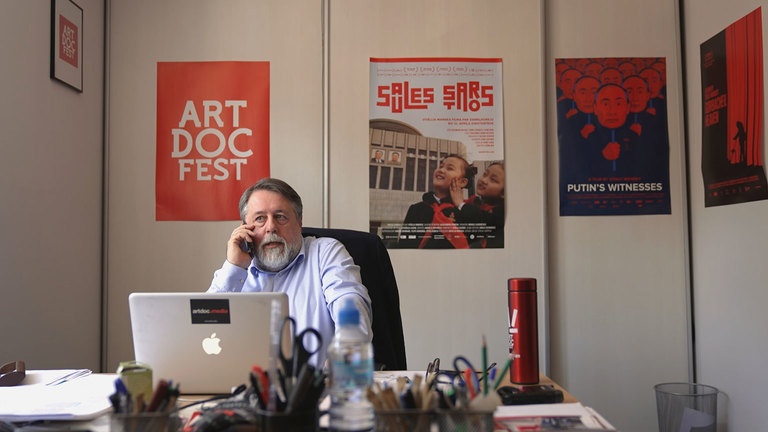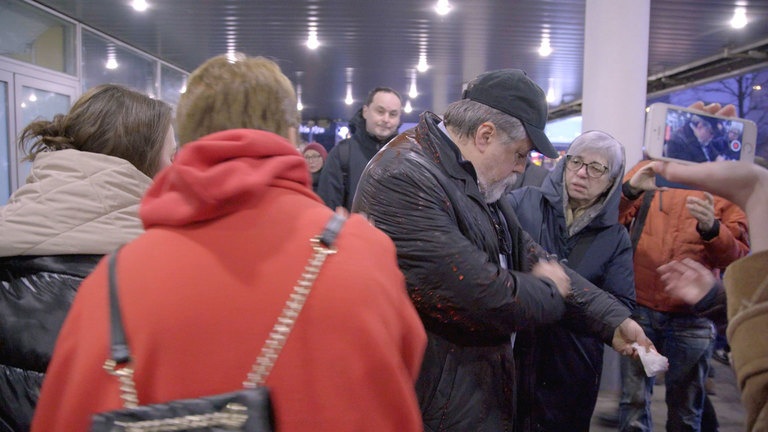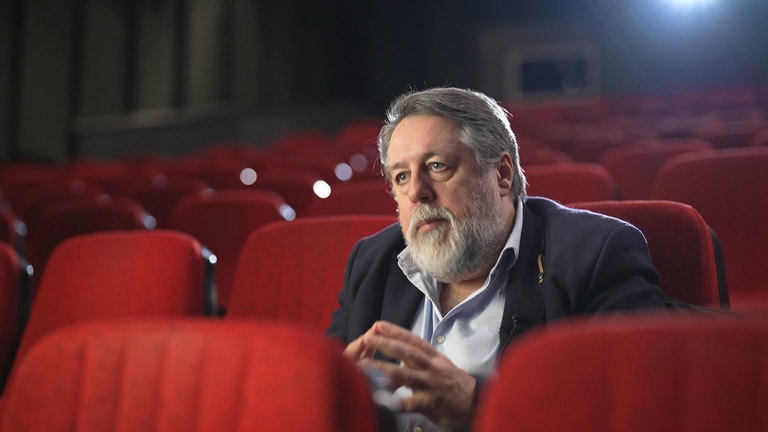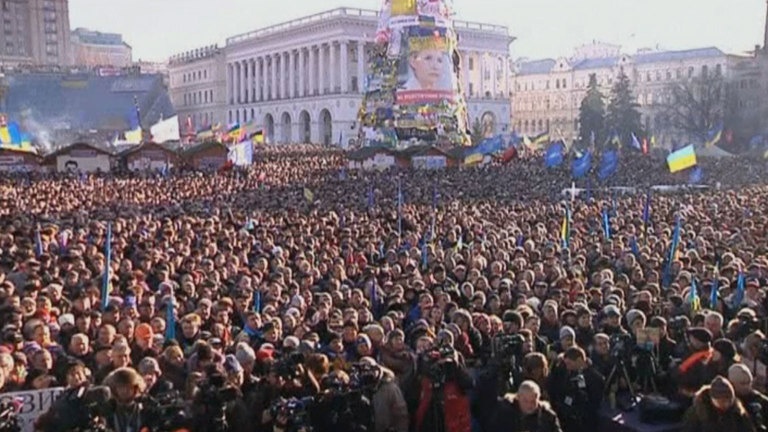Russia - A Filmmaker's Story: Vitaly Mansky / Documentary Filmmaker
Russian filmmaker Vitaly Mansky documented Putin's rise to power in 2000. His films reveal early clues to Putin's objectives in Ukraine and how Russia lost its way on the road to democracy.




Transcript
Direct Talk
Riga, capital of the Baltic state of Latvia,
is home to thousands of Russians.
Many moved here after Russia's
first military incursion into Ukraine in 2014.
Amongst them is the
documentary film maker Vitaly Mansky.
With Russia's Ukraine war now raging,
Mansky's films have taken on a new poignancy,
shedding light on the
underlying divisions behind the conflict.
Back in 2000 Mansky was a rising star
at a Russian state broadcaster
and had exclusive access
to the election campaign
which saw Vladimir Putin
first become President.
Direct Talk meets Mansky in Riga
to hear his reflections on Putin's Russia
Russia: A Filmmaker's Story
From his base in Latvia,
Mansky has been returning to the footage
he filmed of Russia's leaders,
looking for clues to Putin's agenda.
In 2018 one result was his documentary
Putin's Witnesses.
A FILM BY VITALY MANSKY
I'd like to talk to
Vladimir Vladimirovich Putin.
WITNESSES
PUTIN'S WITNESSES
Therefore I want to thank you all
and congratulate you.
Vitaly Mansky
Documentary Filmmaker
When I'm making a documentary,
I try to answer my own questions.
And for me personally the question was,
where did I make a mistake?
Why did Russia end up in a dictatorship?
Why did Russia allow itself
to lose its way towards democracy?
The collapse of the Soviet Union in 1991
was both traumatic and liberating for Russia.
Mikhail Gorbachev's policy of Perestroika
had opened the door to a free press
and for most of the 1990s
under President Boris Yeltsin,
Mansky experienced
the freedom that broadcasters had,
to cover the political and
social life of the new society.
Russia after Perestroika was actually
gaining more and more freedom every day
and was moving steadily toward
becoming a normal, civilised, modern state.
Then came Yeltsin,
who in the first years of his rule
was also, well,
a relatively democratic president.
In many ways this democracy,
which emerged on the territory
of the former Soviet Union,
was based on freedom of speech,
freedom of the press,
freedom of thought.
PUTIN'S WITNESSES
In 1999 an ailing Yeltsin nominated
KGB trained Vladimir Putin as his successor.
Mansky was invited to record events
in Yeltsin's family home.
Tell Grandpa who you voted for.
- For Putin.
For Putin.
At last he said it aloud, for Putin!
In 1999 I was head of
the state television department;
an official,
a producer,
a state employee.
In 1999 you could film anything.
I filmed Yeltsin the way I wanted to.
I talked to him about
what I wanted to talk about.
And in principle, we lived in freedom.
It's almost impossible to believe that today.
PUTIN'S WITNESSES
Vladimir Putin came into power
as a red hot knife in butter.
And the state lurked
in submissive readiness
to follow its new leader.
Mansky continued to film with Putin
for a year after he became President,
capturing some of the changes
Putin introduced.
For example, the President
signed a federal law
to return the army
its banner of victory over fascism.
Of course the red Soviet flag
with the star, the sickle and the hammer.
In just a year,
a man who was virtually unknown
was bringing back the symbols
of the Soviet Empire
that had seemed to be gone forever.
And no one could really oppose him -
at least no one in his circle.
And not even those who,
with their own hands, created Putin.
Mansky challenged Putin over his decision
to restore the music
of the old Soviet national anthem.
Why can't we, listening to the anthem
written by Alexandrov
think about the victory in WW2
rather than the Gulag?
Why should we necessarily
associate this music
with the worst aspects of life
during the Soviet period?
Over the next 14 years
Putin began to close down
all opposition to his rule.
First of all he deals with the media,
with the press.
He shuts down the country's
most popular independent TV channel, NTV.
Then he starts to crack down on business,
with show trials like Khodorkovsky's.
He puts one of the country's wealthiest
and most successful businessmen in prison.
Then he cancels
the elections for regional governors.
Meanwhile the former Soviet states
used their newfound freedom
from Soviet control
to embrace democracy.
In Ukraine, citizens rallied
to the central square in Kyiv
calling for Ukraine
to join the European Union.
This was the event that triggered Putin's
moves against Crimea and in the Donbas,
part of his agenda to restore Russian control
over former Soviet territories.
The attack was a turning point for Mansky
who was born in Soviet Ukraine.
He immediately returned to Ukraine
and began filming his own family.
His film Close Relations
features the rift between
his relatives in Lviv in the West
whose son is called up to fight the Russians
and their cousins in Crimea in the East
who welcomed Russia's take over.
You woke up and you were in Russia.
Right?
You went to bed in Ukraine
and you woke up in Russia.
Everyone around me wanted it
and felt they were Russian.
Even when I came here on holiday.
All my friends spoke
as if they were residents of Russia.
They've always felt they were Russians.
Because their generation
once lived in the Soviet Union.
I understood that my family,
like millions of other families,
was the very model through which to explain
to the world what was really happening.
Vitaly Mansky was born in Lviv
in Western Ukraine,
a town where many soviet movies
about the West were made.
I lived all my childhood
in fact on a film set
and cinema fascinated me.
I had this idea that
I was gonna make musicals.
I thought, well, there are musicals here,
there's Sochi, palm trees,
girls, corps de ballet.
Well, that's the way it is.
That's how I imagined it.
And with that idea,
when I graduated from high school,
I went to Moscow
and surprisingly got accepted
into a film school.
Here he made a student documentary
about a woman
who hanged herself in a Soviet jail
after trying to flee the country.
The school refused to show his film
and it was banned until Gorbachev arrived
when it became acceptable.
I remember peoples' reaction to the film.
The air was thick.
You could poke it with a finger.
There was this energy.
The audience was devouring the film
with their eyes, their ears, their lungs.
And this fascinated me.
Suddenly I felt that this was the
right language to speak to people in.
So I started making documentaries
and I never regretted it.
In 2020 Mansky, by now settled in Latvia,
decided to go back to the man who he credits
for breaking up the Soviet Empire -
former president Mikhail Gorbachev,
now in his 90s.
Friends installed this elevator
for Gorbachev
when they learned that it took him
about an hour
to get to his own bedroom
on the second floor.
There is a theory that
history has its own trajectory
and simply selects the people
who implement these or those changes
which become overdue.
But in the case of Gorbachev
I am rather convinced of just the opposite.
When Gorbachev came, young and energetic,
it was his rise that launched
that process of dismantling,
because he offered freedom.
I believe that you will eventually
be a hero in Russia.
I am convinced of this.
But I'm afraid that it won't happen
either today or tomorrow.
Don't be afraid! Because I tell you -
it takes much time.
And a lot of patience. And skills.
I am grateful to Gorbachev for,
by the way, the best years of my life,
the years of hope,
years of gaining freedom.
Vitaly Mansky
Documentary Filmmaker
He was the first Soviet leader to put
human life above the interests of the state.
That's why in the film Putin's Witnesses,
I emphasise that Putin declares
in the very first moments of his rule
that state interests are
more valuable than human life.
After deciding to leave his job
as an award-winning executive
in Putin's state television,
Mansky developed an independent voice.
In 2007 he founded
the Artdocfest documentary festival
showing independent films
from around the world.
It became a magnet
for Russia's anti-Putin minority.
In March 2022
with the Ukraine invasion underway,
Mansky travelled to Moscow
to open the festival,
knowing that Russian public opinion
backed the war.
There was a team there.
I couldn't just sit comfortably in Riga,
protected from all external factors
and put them face to face
with these threats and challenges.
I knew that the likelihood that we would be
able to accomplish or complete our mission
was very slim.
The festival never started.
The cinema was closed by a bomb threat
and Mansky was attacked outside the venue.
As for the phone calls
about the bomb threat in the cinema
and the people who came with red paint,
it was all a kind of a smokescreen,
a background to the main action.
And the main action
is the destruction of anything that is free,
of anything that is independent,
of anything relevant
that is trying to survive in Russia.
Putin is trying to restore
the Empire of Evil.
And he wants to restore
the world to the way he imagines it.
For Mansky and his immediate family
Riga has become a safe haven.
From here he broadcasts
to Russian speaking audiences.
His message is clear.
In general to me
the most valuable thing
and the most important thing
for each individual person
has always been freedom.
But now that there is war,
I would add the word peace to freedom.
There cannot be peace without freedom.
Freedom is peace.
And that is my message.
Freedom is peace!